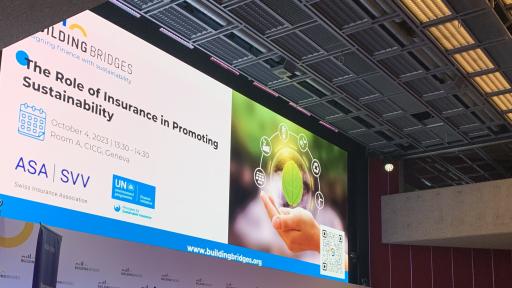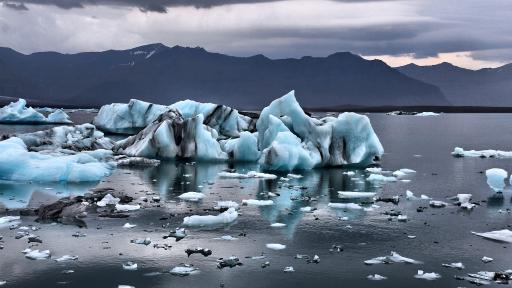‘Scaremongering and activism result in a loss of credibility’
The relationship between climate change and biodiversity, why every company needs climate-compatible strategies and how young employees can be used as a sounding board for sustainability.
David Bresch, Professor for Weather and Climate Risks at ETH Zurich and former Head of Sustainability at Swiss Re, talks about his expectations for COP28, the effects of extreme weather events and emphasises the urgency of net zero. He explains how companies – and individuals – can make a contribution to making the world more sustainable.
35-degree summers and unusually warm autumns – is this the new normal?
David Bresch: Temperature statistics have been available for Switzerland since 1864. In recent decades, we have seen a clear trend: a higher incidence of extreme weather events, such as heatwaves in summer, and also warmer autumns. This does not mean that rainy summers or snowy winters will no longer happen. However, extreme weather events are a reality and we have to prepare for them.
What impact do extreme weather events have on our ecosystems?
They suffer in the heat. If the general conditions – such as the amount of precipitation or the length of dry periods – change faster than the ecosystem can adapt, there is also a threat to biodiversity. A beech forest can easily survive one dry summer, but three dry summers in a row can weaken the strength of a protective forest in an avalanche area and increase the risk of avalanches, causing serious damage.
How do climate change and biodiversity interact?
Climate changes have always occurred throughout history, and ecosystems are perfectly capable of adaptation. However, we humans expect high performance from our ecosystems, and this often depends heavily on stable climate conditions. We are also contributing to changes in climatic conditions so rapidly that ecosystems can no longer keep pace.

David Bresch is Professor for Weather and Climate Risks at ETH Zurich
and former Head of Sustainability at Swiss Re
Source: ewz / Jean-Richard Hadrien
Is net zero by 2050 still realistic?
It all depends on how committed we are to achieving it. It can be done, but we must want it and it does not come free. It will require make massive financial investment to get to net zero, so the financial sector will play a key role. I do not want my pension fund to invest my money in a future in which I do not want to retire. Financial institutes such as pension funds have the necessary capital to finance a sustainable future. And we need innovative companies that are willing to review and fundamentally restructure their processes to reduce their carbon emissions to zero or capture and store them.
If we are able to get to the root of the problem – namely reducing greenhouse gas emissions – we can change the system and prevent tipping points, i.e. dramatic climate changes.
What contribution can I personally make to climate protection?
I believe we can achieve more with less by focusing on quality. For me, that means more holidays in Switzerland, buying regional produce, eating less meat and recycling. Each and every one of us can make a contribution. We know that growth in affluence will not automatically make us happier, but no one wants to give up prosperity. What we need primarily are incentives and no bans for as long as possible.
«Net Zero depends on how comitted we are to achieving it.»
Scaremongering and activism result in a loss of credibility.
A political majority is essential to progress on the issue of climate protection. Radical climate activists damage the debate, as the last elections showed. We have to find solutions, and I believe that our open, liberal and democratic society and our pioneers in business and science will do just that. The goal – net zero – is clear, so let’s set out to achieve it together.
What leverage do companies have?
It is most important to review their business strategy in terms of its climate compatibility. How can we reach net zero? Is our strategy climate-resilient? For example, can we structure and adapt our processes to maintain productivity in a hot summer? Does our strategy preserve or promote biodiversity? Measures will vary from sector to sector, but they will all focus on economic sustainability. How can we design our products and services so we can sell them in the long term? It may make sense to create a position in the company to deal with sustainability-related issues. It’s also important to listen to external feedback and collaborate with competitors and companies in the same sector.
What else can companies do?
Young employees should definitely be involved in discussions about sustainability and climate protection. Many of them understand that they are living in a world they can and must help to shape through dialogue. Companies can include them in strategy development as a sounding board. Which products and services do they really need? What price are they willing to pay? Young people always check a prospective employer’s climate protection and sustainability track record. They have no interest in working for a company without a future. Companies that demonstrate a proactive commitment to sustainable and climate-friendly solutions have a competitive advantage and as an employer.
What role does the insurance industry play in sustainability?
The insurance sector can make the biggest difference in the areas of prevention, underwriting, product management and investments. Unlike other industries, the insurance sector has a vested interest in limiting the effects of global warming since those risks are on its own balance sheet. Insurance companies want to offer attractive premiums, but they can do this only if the risks are under control. Switzerland is a good example in this respect with cantonal building insurance and its natural perils pool. Here, we have a major advantage over other countries, as there is general consensus in the insurance industry that it makes no sense to shoulder certain risks individually – i.e. the individual home owner or the individual insurer in the case of natural hazard insurance. We need to strengthen these instruments.
The 28th World Climate Change Conference will start in Dubai in two days' time. What outcome are you hoping for?
Expectations are low in view of the current geopolitical situation. In fact, we can call it a success if everyone shows up and stays at the table. We must do everything we can to ensure that the dialogue continues. It’s also crucial that countries adhere to their nationally determined contributions, i.e. their national efforts to reduce greenhouse gas emissions. And we must not forget the importance of the discussions behind the scenes. The host may not be the most credible in terms of decarbonisation, but if you consider the region’s investment potential, the conference location has been chosen very wisely.
About Professor David N. Bresch
David N. Bresch is a Professor for Weather and Climate Risks at ETH and MeteoSwiss whose research focuses on the impacts of weather and climate on socio-economic systems. He combines computer modelling with in-depth dialogue involving various stakeholder groups as the basis for the development of decision-support tools with partners in government and industry. David Bresch has a doctorate in physics, worked at Swiss Re for many years and was a member of the Swiss delegation to the UN climate negotiations.


